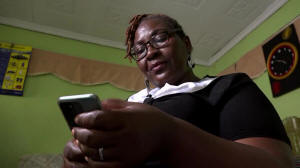Stigma and poverty stymie cancer treatment as rates rise in Kenya
 Send a link to a friend
Send a link to a friend
 [February 11, 2023]
NAIROBI (Reuters) - Like many people in Kenya, Sperenza Maina
went into denial when she was first diagnosed with breast cancer, hiding
it from her family for months and delaying important treatment. [February 11, 2023]
NAIROBI (Reuters) - Like many people in Kenya, Sperenza Maina
went into denial when she was first diagnosed with breast cancer, hiding
it from her family for months and delaying important treatment.
But the most painful part of the librarian's cancer journey has been the
crippling financial burden, with each round of chemotherapy costing
35,000 Kenyan shillings ($280.11), more than a month and a half of an
average salary in Kenya.
"Where can you get the money from? Sometimes even you call people, but
they don't pick your calls," she said, bursting into tears.
As in much of Africa, most cancer cases in Kenya are diagnosed at an
advanced stage, when treatment options are limited and families make
huge sacrifices by selling assets or borrowing money, according to a
World Bank report.
With less than 20% of Kenya's 53 million people enrolled in the national
health insurance scheme, healthcare costs push more than a million
Kenyans into poverty annually, the report said.

As the country gets wealthier, cancer diagnoses are on the rise; annual
incidence increased by almost 30% between 2012 and 2018, data from the
health ministry shows.
The ministry blames improved life expectancy -- which has risen eight
years since 2020 -- and the increasing adoption of risky behaviours like
unhealthy diets, lack of physical exercise, alcohol abuse and smoking.
[to top of second column]
|

Cancer diagnoses are on the rise in
Kenya, but with less than a fifth of people enrolled in a national
insurance scheme, getting a diagnosis can force families to make
huge financial sacrifices. Stigma only makes things worse. Angela
Johnston reports.
 Stigma makes the problem worse.
Women in Kenya often fear seeking diagnosis for some of the most
common and deadly cancers in Kenya such as cervical and breast
cancer, said Bridget Nyabuto, a doctor at the Nairobi Radiotherapy
and Cancer Centre.
"Any topics to do with sex, the female reproductive system, are a
bit taboo," Nyabuto said. "They go thinking (that) if I go speaking
to my husband, the one who's meant to take me to hospital, I'll be
replaced."
Having overcome her trepidation and financial woes, Maina, who was
first diagnosed in 2018, has become more hopeful even though she has
recently found out that the cancer has come back.
"There are those that have been there for me. Having cancer is not a
death sentence, you have to live to tell the story," she said.
($1 = 124.9500 Kenyan shillings)
(Reporting by Nelson Aruya and Mukelwa Hlatshwayo; Writing by
Hereward Holland; Editing by Bhargav Acharya and Caitlin Webber)
[© 2023 Thomson Reuters. All rights
reserved.]This material may not be published,
broadcast, rewritten or redistributed.
Thompson Reuters is solely responsible for this content. |